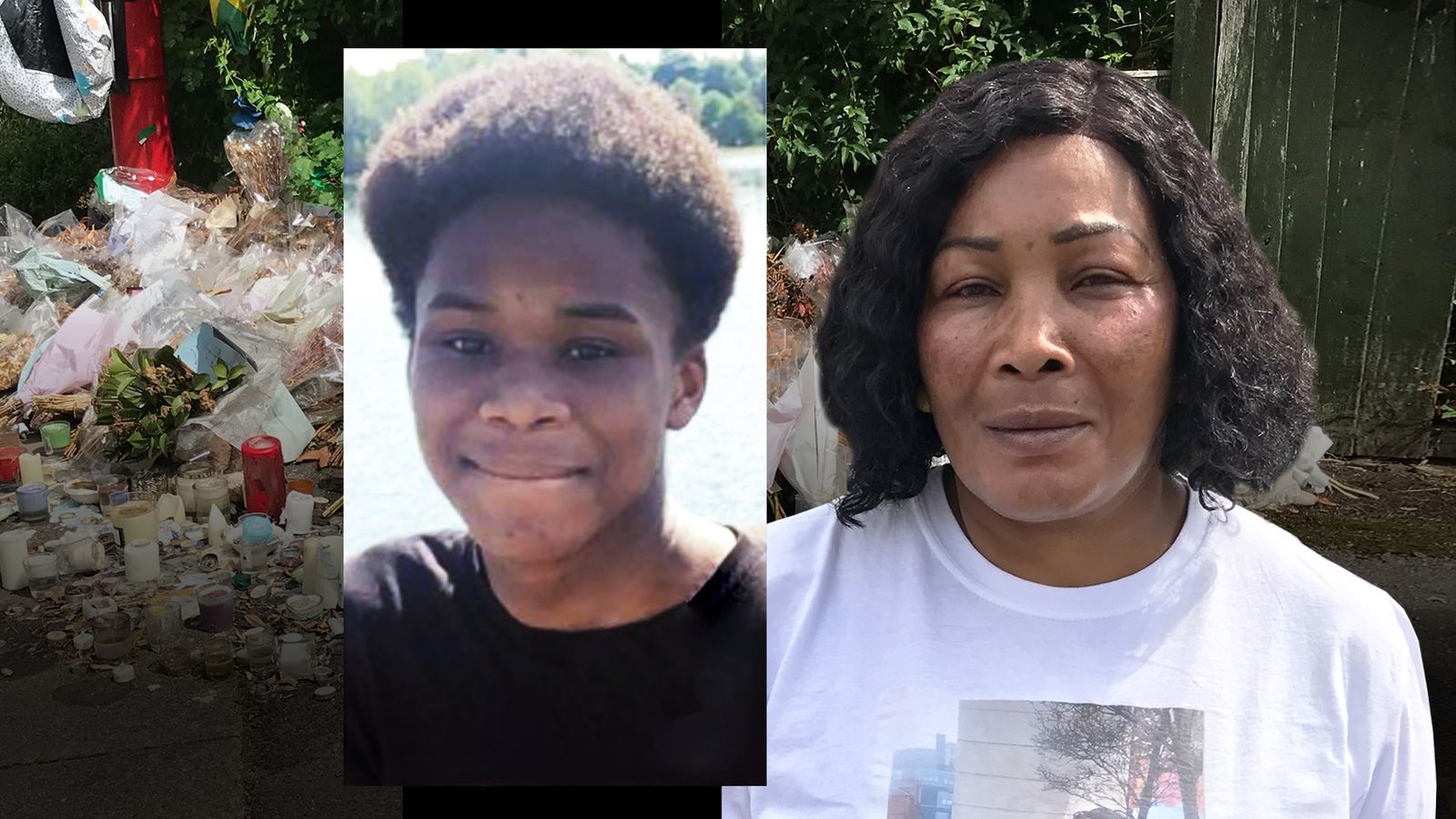The chief constable of West Midlands Police has committed to making youth violence his top priority on the day the family of another murdered teenager bury their child – the fourth in five months.
Ahead of his funeral on Wednesday, the family of 14-year-old Dea-John Reid said “nothing makes sense” and urged young people to stop carrying knives.
His brother Kirk Bryan told Sky News: “To know that somebody just took my brother’s future away. It’s just horrible.
“I don’t understand – why would you do something like that?”
‘Pandemic’ of violence
Dea-John was the fourth teenager to be murdered in the space of five months in Birmingham.
Parents in the city have described a “pandemic” of violence and spoken of their fear over who will be targeted next.
In Handsworth, one mother told Sky News: “Everyone knows someone who has been murdered.”
Meanwhile children who are coming to terms with losing friends describe a city where they have to stay in certain “zones” to make sure they don’t get stabbed.
West Midlands Police chief constable Dave Thompson says tackling youth violence is his “top priority”.
“Nobody could hide the fact that in our major cities this issue of young people and children being involved in violent acts, the carriage of weapons, gangs, and the county lines phenomena around drugs is a major concern,” he said.
Last year across the country the numbers of victims of homicide aged between 16 and 24 rose to 143, an increase of 33 on the previous year.
Four teenagers killed in five months
Dea-John Reid, 14, is among the four teenagers who have been killed in the past five months in Birmingham.
He was stabbed in the Kingstanding area on the city on the evening of 31 May.
A 35-year-old man will stand trial accused of his murder in February next year.
Delarno Samuels was just 17 when he was stabbed to death in Smethwick a month earlier on 1 May.
He was found with knife wounds in a crashed car and was later pronounced dead.
An 18-year-old man has been charged with his murder.
Keon Lincoln, 15, was shot and stabbed in Handsworth on the afternoon of 21 January.
Five boys aged between 14 and 16 are being investigated by the police.
The latest victim of youth violence in the city was 18-year-old Kimani Martin who died after being shot in a taxi in Tividale on 20 June.
Three men aged between 19 and 23 have been charged with his murder, with a fourth man still under investigation.
‘Nothing makes sense to me anymore’
At the scene by a busy road in Birmingham where Dea-John Reid was killed, his mother and brother laid flowers ahead of his funeral.
It’s over a month since Dea-John died, but a sea of tributes to the teenager remain. Among them, a poem and handwritten note, which reads: “Your Dad loved you with all my heart”.
Kirk Bryan, 29, is Dea-John’s older brother.
He fights back tears as he describes the moment he found out his sibling had been murdered.
“I was lost for words. I couldn’t believe that my little brother was gone. I still don’t believe it now. Every day I feel like I see him,” he said.
“To know that somebody just took my brother’s future away. It’s just horrible.
“Why would you do something like that? I don’t understand – nothing makes sense to me anymore.”
To children and teenagers who carry knives he has a clear message: “Just stop. Just stop.”
He is now the support for Dea-John’s heartbroken mother, Joan Morris.
She says the loss of her “talented boy” has been devastating.
“It affected me mentally, emotionally, I don’t know how to explain,” she said.
She recalls the last time she spoke to Dea-John. He had been out playing football and she had called his mobile.
“I said ‘Dea-John I’m home so do you want me to comb your hair’ and he said yes – he still wanted me to comb his hair. And he said ‘Mum, just give me 40 minutes, I’ll be there’.
The next time she tried his phone he didn’t answer. “That’s when I got the news that Dea-John had died,” she said.
‘I’ve lost two friends in five months’
Pharrell Helsby, 15, has lost two friends to violence this year.
He knew Dea-John since they were both young growing up in Birmingham, and met Keon Lincoln when they were at the same secondary school.
“Losing two friends within five months, it’s not it. It’s just not,” he told Sky News.
“It doesn’t make sense. How much people are actually going to die until something gets resolved?”
He describes how he felt when he was told his friends were dead.
“I get a bunch of emotions at the same time, I get angry I get sad,” he said.
And yet one thing he didn’t feel was surprised.
“It’s every day on the news…somebody’s dying every day,” he explains.
“It happens on a regular basis now so you can’t really be shocked. It’s like you’re expecting it.”
He describes the city having “zones where you know you won’t get stabbed” and says teenagers need to know “where not to go”.
But he adds: “Let’s be honest, there are too many people dying on a day-to-day basis. That’s how I genuinely feel.”
‘You’ve got three paths in life – the yard you live in, a prison yard or a grave yard’
Michelle Helsby knows first-hand the devastating impact of violent crime.
One of her sons is in prison for aggravated robbery after years of being stuck in a cycle of violence.
“He got stabbed, he’s been shot at. He nearly lost his life last year. He then committed a crime and he ended up getting 12 years in prison,” she said.
“His life has been taken away from him, he’s now part of the system.”
She knows the families of Keon Lincoln and Dea-John Reid, who were both murdered this year. Her 15-year-old son knew both boys.
The grief and loss has spurred her into action. She’s now trying to raise funds for a youth centre to get young boys off the streets.
She recalls spending time at the Muhammad Ali Centre when she was young, a community centre opened by the boxer in the Hockley area of Birmingham.
But since it was gutted by a fire in 2002 it has stood derelict. Used needles litter the floor.
Attempts to raise money in the community are slow as people struggle financially during the coronavirus pandemic.
Walking through Handsworth she recalls a saying among parents in the area.
“It goes ‘You’ve got three yards. One’s the yard you live in, one’s a prison yard and one’s a grave yard’. That’s basically your three paths in life,” she said.
She tried to warn the authorities after Keon died in January that the violence was spreading among young teenagers. Then Dea-John was killed.
“What are they waiting for?” she asks. “A thirteen-year-old? A twelve-year-old?
“It’s like a pandemic because it’s not stopping. They’re on about the virus but the kids are dying just as quick as the virus is taking people and it’s just mad.
“Mother’s shouldn’t be burying their sons.”
24/7 world of social media behind violent conflict
Chief Constable of West Midlands Police Dave Thompson rejects the idea that communities are being forgotten.
“I don’t think any of us could imagine there’s anything more of a priority than preventing young people from being subjected to violent attacks on the street and killed,” he says.
“It’s the top priority. Are we very concerned about those murders we’ve seen? Of course we are. Children should not be subjected to violent attacks on the street and murdered.”
He says crimes involving younger victims are “a feature that we’ve seen develop over the last four to five years across the country.
“We have some very young victims and some very young perpetrators,” he says.
“About 38% of our perpetrators of violence in terms of murders are under 25.
“It’s a younger group and we have definitely seen some younger people involved in gangs.”
He adds that around a quarter of murder victims are also under 25.
He describes work going on “behind the scenes” to monitor social media and covert policing to target criminals who are supplying weapons.
“Particularly during these times of COVID where a lot of people aren’t in school or college their vulnerability is a major concern and so a lot of our work and our highest priority and focus is on this area,” he says.
“For the police there are two things. There’s clearly the work around gangs and drugs.
“But there’s something more generally, mainly about young men and how they’re dealing with violence and confrontation.
“They’re living in a very 24/7 world. If I’m disrespected on social media my reaction can be instantaneous.
“The disrespect is seen by other people, I feel the need to resolve. That type of environment generates conflicts.”






















